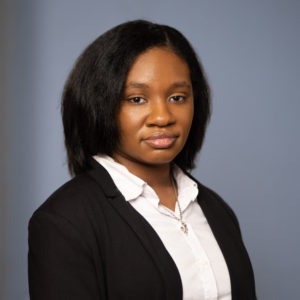 This post was written by Evelyn Davis who attended the 2023 DLF Forum as a Forum Fellow. The views and opinions expressed in this blog post are solely those of the author and do not necessarily reflect the official policy or position of the Digital Library Federation or CLIR.
This post was written by Evelyn Davis who attended the 2023 DLF Forum as a Forum Fellow. The views and opinions expressed in this blog post are solely those of the author and do not necessarily reflect the official policy or position of the Digital Library Federation or CLIR.
Hello, My name is Evelyn Davis and consider myself the HBCU archivist. I am a Processing Archivist and Digital Humanities Librarian at Prairie View A&M University in Prairie View, Tx. I assist with helping the university re-discover their history since PVAMU is the second oldest university in the state of Texas. While obtaining my dual master’s degrees, I had a passion and interest in African American Studies within Special Collections, so when I got the offer to work at an HBCU, I am honored to become a part of a rich history and legacy of families here in Prairie View, Tx. My other hobbies include writing poetry, dancing, bowling, painting artwork, exploring my local museums, blogging, and podcasting. Additionally, I am a Louisiana native, born in the New Orleans area and greatly influenced by my Creole heritage to embrace different cultures and having the need to preserve historical places. As a result, my love for cultural preservation started out combining my passion for writing and wanting to preserve stories at the same time. So, I am happy to continue my journey into Black Librarianship and strive to help communities preserve their stories for future generations.
Bridging Together Community Archives and the Digital World
We all have to start somewhere.
When I attended the 2023 DLF Form Conference, I listened to librarians who had taken the challenge to preserve born-digital records and digitize records. As a new Digital Humanities librarian, I was still learning my way into incorporating digitizing archival records at my institution and sought out this conference to observe digitization projects at other institutions. From the glory days, I listened to past fellows share their experiences with past projects, dealing with bringing archival collections into the digital world, sharing their knowledge with the attendees, and giving me hope that I can achieve the one daring goal that I have as a new librarian.
The reason I chose to attend the DLF Forum conference is to learn more about how I can incorporate archives preservation and digital humanities in the Archives and Special Collections Department.
Before arriving in St. Louis, Missouri, I strategically planned each session I would attend to learn more about archives, preservation, and putting together digital preservation projects. In addition, I would listen to presenters’ experiences with trying to involve more of the community aspect than other librarians. In particular, I attended the crowdsourcing project session by Kat Hagedorn, Emiko Hastings, and Justin Schell, where I learned about the University of Michigan, and used a project involved in transcription and getting the community involved with transcribing, postcards, and penmanship. I was inspired by the librarian’s bravery to include the public’s knowledge within such a project since archival materials can sometimes be sensitive, or possibly controversial with certain topics being present in the collection. Yet, the responses that the librarians received from the public resulted in building a community unknowingly and without intentions. The individuals who share the same love of trains, landscapes, or animals have more knowledge about certain objects and experiences while living in Michigan, and so on.
I am grateful to hear about another institution creating this type of project and willing to share it with others as you may never know how a digitization project will come together. After the session, I carefully glanced at the conference’s schedule to attend more sessions like this one involving themes about archives and community engagement. I was inspired to hopefully one day create a similar digital project where the participants can come together, but I was hesitant at first about how to get started, or using the right resources that could best hope for the best results to complete processing a collection.
Just like how libraries have come together for a conference to gain more knowledge and resources, I hope to build a community archive using a crowdsourcing project like identifying individuals in pictures from an HBCU collection. I have high hopes that my institution will bring together the community within both Prairie View and Waller to continue to preserve their history. At the end of the day, I would recommend any Digital Humanities librarians to attend the DLF Forum conference simply not for the networking aspect, but to listen and observe how everyone is experiencing the digital world, new software, and utilizing social media to make collections more discoverable to the patrons.
